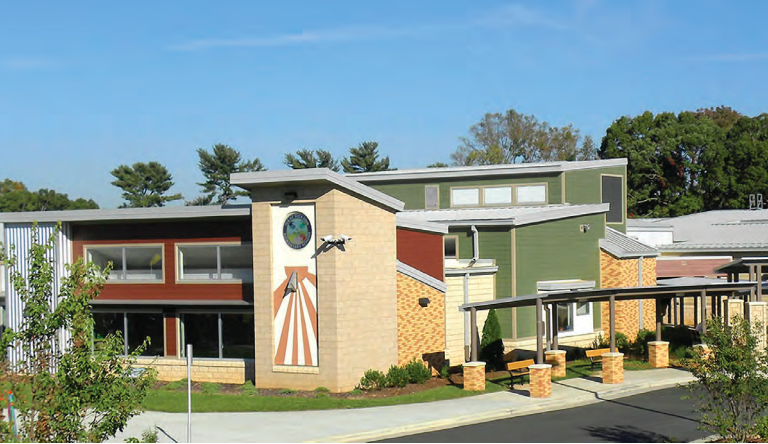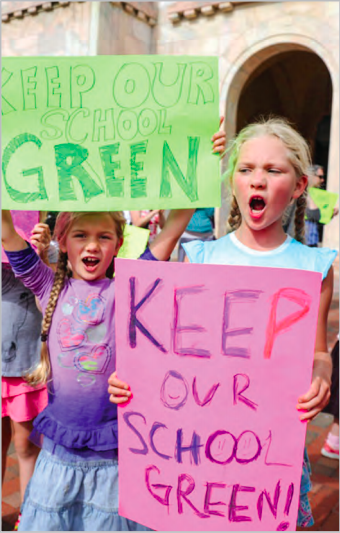Green Built Alliance’s Appalachian Offsets program is celebrating the successful completion of its fundraising campaign to install a solar system at Isaac Dickson Elementary School in Asheville.
Appalachian Offsets funds renewable-energy projects and energy-efficiency upgrades in Western North Carolina schools, nonprofits and low-income housing by pooling money contributed by local businesses and individuals through its voluntary carbon-offset program.
Appalachian Offsets finished fundraising for the Isaac Dickson solar project — its largest undertaking to date — in late 2019 and the system is expected to be installed on the school’s roof in September 2020.

“Over two years, more than 100 donors contributed directly to make this project happen,” Green Built Alliance Executive Director Sam Ruark-Eastes said. “This was a collective effort and we couldn’t have done it without the support of our many donors and the large contribution of an anonymous donor who reached deep into their pockets to fund this effort. We are so grateful to live in a place that values clean energy for schools.”
Isaac Dickson was designed as one of the state’s first Net Zero Energy schools and has been awaiting the solar system to help it move toward that vision since it was built in 2016.

The school will receive a 300 kW photovoltaic array on several roofs with a total price tag of $428,000. Appalachian Offsets coordinated the fundraising efforts, collecting $55,000 through community contributions, while an anonymous donor generously committed $250,000. The project is also being made possible through a $75,000 rebate from Duke Energy as well as Asheville City Schools’ allocation of $48,000 in energy-efficiency rebates it received for Isaac Dickson.
The solar array will be a net-metered system, resulting in the school’s electric bill being lowered by more than $30,000 per year with a 30-year savings of more than $1.3 million, according to Sundance Power Systems, with which Asheville City Schools has contracted to install the system. Through an agreement with Buncombe County, the money saved on Isaac Dickson’s electric bills will go back into school operations.
“The Isaac Dickson project is an expression of the dedication and commitment of this community for taking action against climate change and to leverage this technology to benefit our school system for years to come,” Sundance Power Systems President Dave Hollister said. “With the leadership of the Green Built Alliance and its Appalachian Offsets program, teachers and concerned citizens were able to raise the money for the project. This is community solar at its best.”
In addition to reducing the school’s energy bills, Isaac Dickson will leverage the asset as a teaching resource by weaving information about photovoltaics and data from the on-site solar system into curriculum for students.
“Installing a rooftop solar system will fulfill the architects’ vision of using the school building itself as learning tool that can be used to facilitate discussions about our environment and conservation, as well as the impacts of fossil fuel consumption not just on our climate but also on our air and water quality,” said Isaac Dickson parent Matt Menne, who played an integral role in fundraising efforts during his time as co-president of the school’s PTO. “What better way to help than by reducing the carbon footprint of our schools, which provides the added benefit of saving money on energy costs for the district in the long run.”
With the Isaac Dickson system coming to fruition, Green Built Alliance is inviting fellow nonprofits and local schools to apply for financial support on future clean-energy projects through Appalachian Offsets.
There is a rolling application submission window to be considered for funding support as one of Appalachian Offsets’ future projects. Appalachian Offsets has historically completed a variety of energy-efficiency and renewable-energy projects over its 15-year history in Western North Carolina, but the program is also open to considering applicants with carbon-sequestration plans. To receive funding, the project must be under the umbrella of a nonprofit, school or coop.
Individuals or businesses interested in supporting the work of Appalachian Offsets can visit cutmycarbon.org to calculate their carbon footprint and offset emissions by paying into the community fund that supports these projects in local nonprofits, schools and low-income housing.
Organizations interested in applying for this funding and those with additional questions can email Green Built Alliance Executive Director Sam Ruark-Eastes at sam@greenbuilt.org.
Cari Barcas is community engagement director at Green Built Alliance. She has more than a decade of experience in communications and nonprofit management, including time reporting on the green building scene in Chicago as a journalist covering residential and commercial real estate. Connect with Cari at Cari@greenbuilt.org.
You can also view this article as it was originally published on pages 54-55 of the 2020-2021 edition of the directory.

